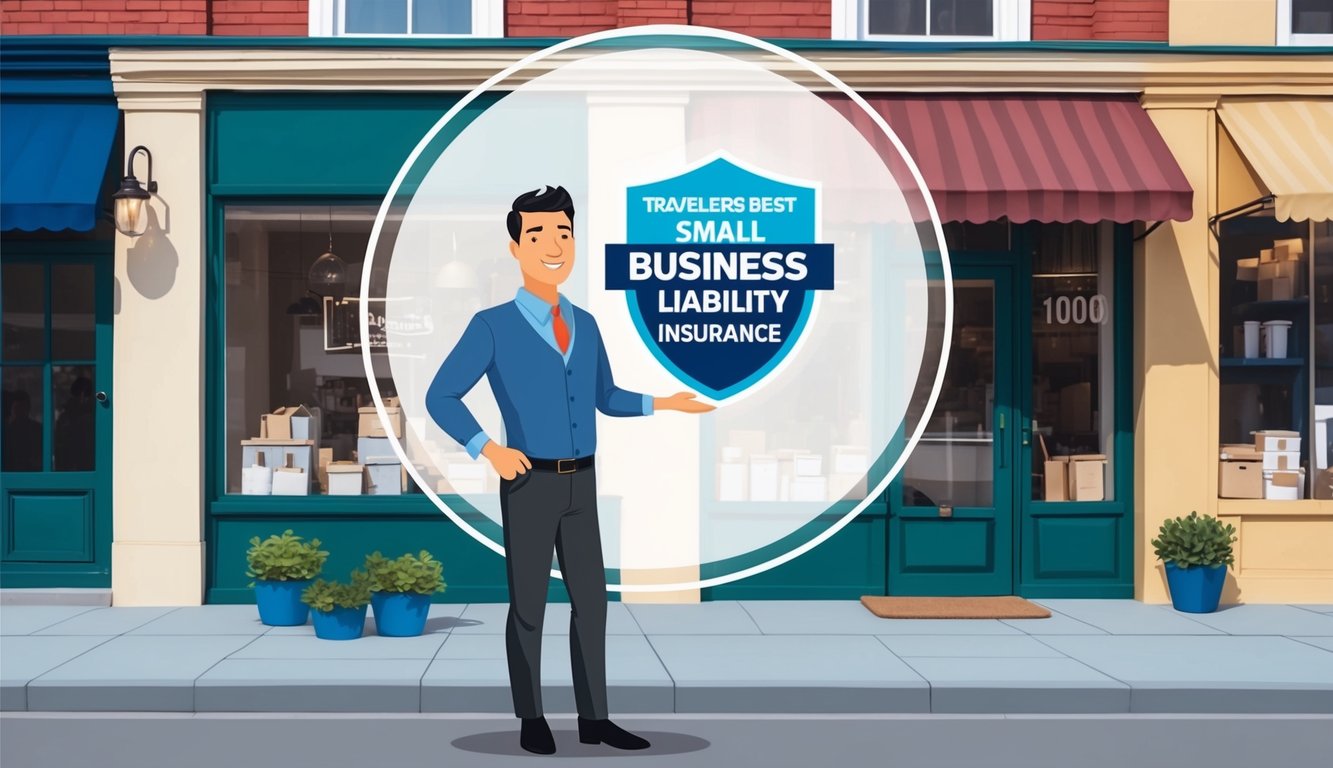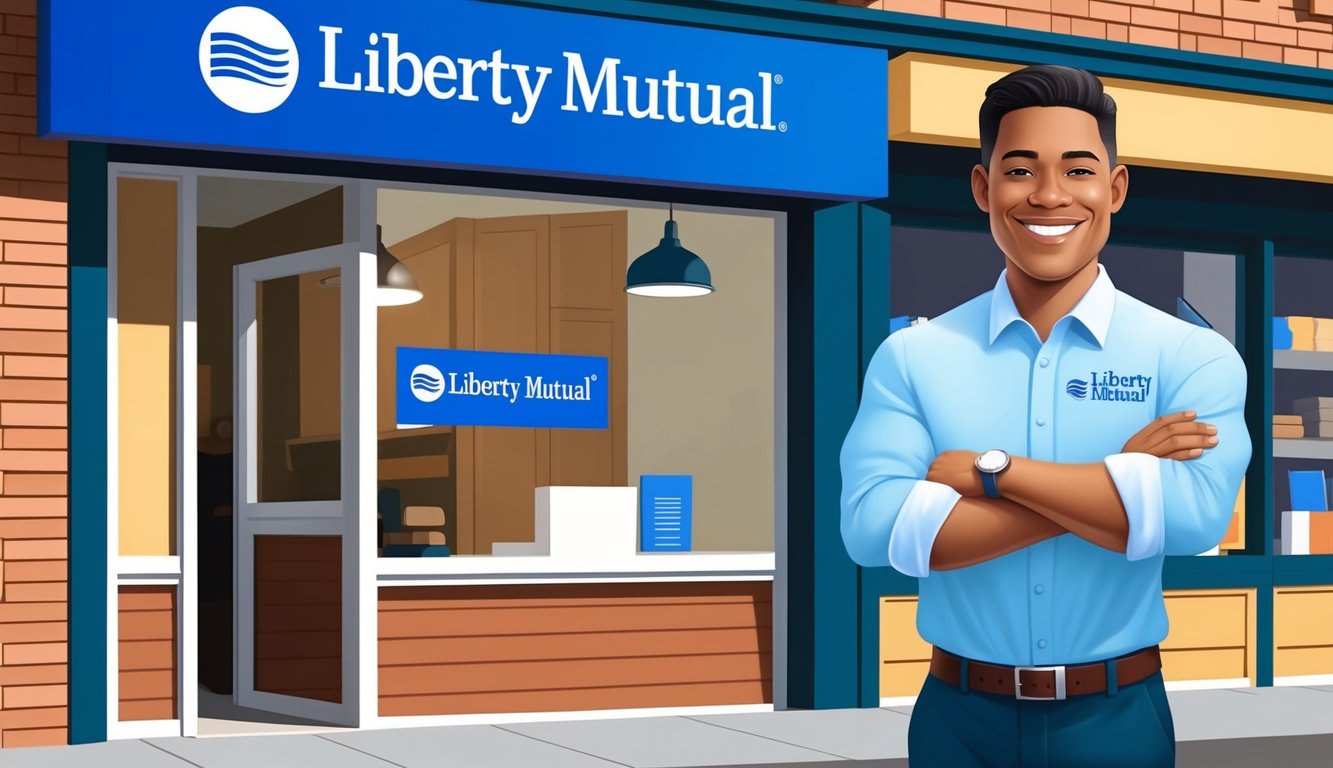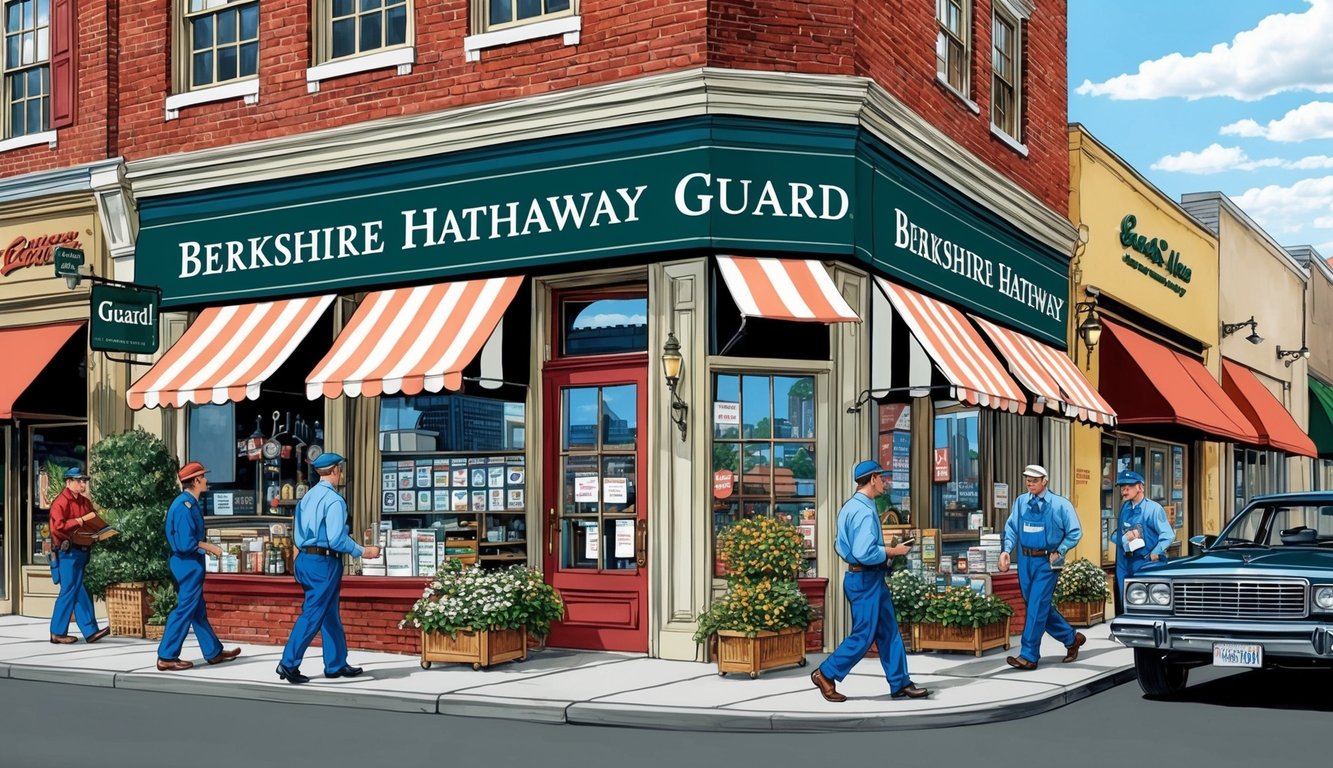Small business owners face numerous risks in their day-to-day operations.
Protecting your company from potential legal claims and financial losses is crucial for long-term success. General liability insurance provides a safety net against common business risks, offering peace of mind and financial protection.
General liability insurance for small businesses typically costs around $42 per month, but your actual costs may vary depending on factors specific to your business.
When choosing a policy, it’s important to consider coverage options, financial stability of the insurer, and customer satisfaction ratings.
By comparing different providers, you can find the best fit for your small business’s unique needs and budget.
1) Next Insurance
Next Insurance offers tailored general liability coverage for small businesses.
Their policies are designed to protect you from common risks like property damage and bodily injury claims.
You can easily purchase and manage your policy online.
Next Insurance provides a user-friendly digital platform that allows you to get a quote, buy coverage, and access your policy documents 24/7.
The company offers flexible payment options, including monthly installments.
This can help you manage your cash flow more effectively.
Next Insurance’s general liability policies typically include coverage for medical expenses, legal defense costs, and settlements.
You can customize your policy limits based on your specific business needs.
The company caters to a wide range of industries, from contractors to consultants.
They understand that different businesses face unique risks and tailor their coverage accordingly.
Next Insurance also offers the option to bundle general liability with other types of business insurance.
This can potentially save you money on your overall insurance costs.
You can expect competitive pricing from Next Insurance.
Their streamlined digital approach often results in lower overhead costs, which can translate to more affordable premiums for you.
Customer support is available if you need assistance with your policy or have questions about your coverage.
Next Insurance aims to provide a smooth and straightforward insurance experience for small business owners.
2) Hiscox

Hiscox stands out as a top choice for small business liability insurance.
As America’s leading online small business insurer, Hiscox offers over a century of experience in the industry.
Their general liability insurance protects your business from claims of bodily injury, associated medical costs, and property damage.
This coverage is essential for safeguarding your company’s assets and reputation.
You can easily obtain a quote online or by phone.
Hiscox provides a user-friendly experience, allowing you to see options and pricing in minutes.
The company’s financial stability is noteworthy.
Hiscox carries an A (Excellent) rating from AM Best, demonstrating their ability to cover claims reliably.
In addition to general liability, Hiscox offers a business owner’s policy.
This combines general liability with property insurance, covering damage to your furniture and equipment at up to five locations.
Hiscox’s rates are often competitive in the market.
You may find their pricing attractive compared to other insurers, especially for small businesses.
When considering Hiscox, you’ll benefit from their specialized focus on small business insurance.
Their policies are tailored to meet the unique needs of entrepreneurs and small company owners.
3) Progressive Commercial

Progressive Commercial offers a range of business insurance options tailored to small enterprises.
Their general liability coverage helps protect your business from potential financial losses and lawsuits.
In 2023, the national median cost of general liability insurance through Progressive was $59 per month.
This price point makes it an affordable option for many small business owners.
Your specific rate will depend on factors unique to your business, such as your industry and the types of jobs you perform.
Progressive takes these elements into account when calculating your premium.
The company provides coverage for various industries, making it a versatile choice for different types of small businesses.
Whether you run a landscaping company or a professional services firm, you can find suitable coverage.
Progressive Commercial also offers other types of business insurance, including professional liability and workers’ compensation.
This allows you to bundle different policies to create comprehensive coverage for your business.
When considering Progressive Commercial, keep in mind that their online platform makes it easy to get quotes and manage your policy.
This convenience can be particularly beneficial for busy small business owners.
Remember to review the specific coverage details and limits to ensure they meet your business needs.
Every business is unique, so it’s important to choose a policy that provides adequate protection for your particular situation.
4) State Farm
State Farm offers a range of small business insurance options to protect your company from various risks.
Their coverage includes standard policies like commercial auto and liability insurance, as well as specialized options for different industries.
You can obtain professional liability insurance through State Farm to safeguard your business against claims of errors, omissions, or negligence.
This coverage can help with legal defense costs and potential settlements.
State Farm has been providing business insurance since 1935, giving them extensive experience in helping small business owners manage risk.
Their network of local agents can offer personalized advice tailored to your specific business needs.
To get a quote for State Farm business insurance, you can contact a local agent directly.
They’ll assess your coverage requirements and provide an estimate based on your company’s unique situation.
State Farm offers insurance for over 200 professions across various industries.
This wide range of options increases the likelihood that you’ll find suitable coverage for your specific business type.
While State Farm is a reputable insurer, it’s wise to compare their offerings with other providers.
Consider factors such as coverage limits, deductibles, and customer service when making your decision.
5) The Hartford
The Hartford is a well-established insurance company with over 200 years of experience in the industry.
They offer a range of small business insurance options, including general liability coverage.
When you choose The Hartford for your liability insurance needs, you can expect comprehensive protection for your business.
Their general liability policies typically cover bodily injury, property damage, and personal and advertising injury claims.
The Hartford’s general liability insurance costs an average of $805 per year or about $67 per month.
However, your actual premium may vary depending on factors such as your industry, location, and claims history.
You can easily obtain a quote from The Hartford to get a precise estimate for your business.
Their online platform allows you to quickly compare different coverage options and find the best fit for your needs.
The Hartford’s liability policies can be customized to suit various business types and sizes.
Whether you’re a startup or an established LLC, you can find coverage that aligns with your specific requirements.
With The Hartford, you’ll benefit from their extensive experience in handling claims.
They boast a 4.8/5 star claim experience rating, indicating high customer satisfaction with their claims process.
If you have questions or need assistance, The Hartford’s customer service team is available to help.
You can reach them by phone during business hours to discuss your insurance needs or get clarification on policy details.
6) Nationwide
Nationwide offers general liability insurance tailored for small businesses.
This coverage protects your company from unexpected accidents and claims.
You can customize your policy to fit your specific business needs.
Nationwide’s general liability insurance covers bodily injury, property damage, and personal and advertising injury claims.
The company provides flexible payment options to help manage your cash flow.
You can choose monthly, quarterly, or annual payments for your premium.
Nationwide also offers additional coverage options.
These include professional liability, workers’ compensation, and commercial auto insurance.
You can easily get a quote online or speak with an agent to discuss your coverage needs.
Nationwide’s representatives can help you understand the different policy options available.
The company has a strong financial rating, which indicates stability and reliability.
This can give you peace of mind knowing your business is protected by a reputable insurer.
Nationwide provides resources and tools to help you manage risks in your business.
These include safety training materials and loss control services.
You can file claims 24/7 through Nationwide’s online portal or by phone.
Their claims process is designed to be quick and efficient, helping you get back to business as usual.
7) Travelers

Travelers is a well-established insurance company that offers comprehensive small business insurance options.
Their coverage includes general liability, which is essential for protecting your business from potential lawsuits and financial losses.
When you choose Travelers, you gain access to a wide range of industry-specific policies.
This means you can find coverage tailored to your particular business needs, whether you’re in retail, construction, or professional services.
Travelers provides general liability insurance as part of their business owner’s policy (BOP).
This package combines property and liability coverage, offering protection for your business assets and potential legal claims.
One notable feature of Travelers is their professional liability insurance for small businesses.
This coverage can be included automatically in your BOP or added as an enhancement, providing broader coverage limits.
Travelers is known for its financial stability, which is crucial when selecting an insurance provider.
You can have confidence in their ability to pay claims when needed.
The company also offers risk management insights and guidance.
This additional support can help you identify potential hazards and implement strategies to minimize risks in your business operations.
When considering Travelers for your small business liability insurance, keep in mind that they were ranked as the second-largest writer of business insurance in the U.S. in 2021.
This speaks to their experience and market presence in the industry.
8) Liberty Mutual

Liberty Mutual offers comprehensive general liability coverage for small businesses.
This insurance can help protect your company from costs related to lawsuits involving bodily injury, property damage, or personal and advertising injury.
The company provides tailored protection to address your specific industry risks.
You can choose coverage that fits your unique business needs, whether you operate a retail store, restaurant, or professional services firm.
Liberty Mutual’s small business owner’s policy (BOP) combines property and liability insurance into a single, convenient package.
This bundle is designed for smaller businesses and can be customized to suit your requirements.
You can expect coverage for over 300 classes of businesses with Liberty Mutual’s BOP.
This flexibility allows you to find the right protection for your particular enterprise, regardless of your industry.
Liberty Mutual’s business insurance offerings extend beyond general liability and property coverage.
You can also obtain workers’ compensation, commercial auto, and other specialized policies to create a comprehensive insurance package for your small business.
With Liberty Mutual, a well-established provider, you gain access to a range of business insurance solutions.
Their experience in the industry can provide you with peace of mind as you protect your business from potential risks and liabilities.
9) Berkshire Hathaway GUARD

Berkshire Hathaway GUARD offers comprehensive small business insurance options to protect your enterprise.
Their coverage extends to various main street establishments, from pizza shops to auto repair businesses.
You can expect tailored solutions that safeguard your professional assets, vehicles, and employees.
Berkshire Hathaway GUARD understands the unique needs of small business owners and has been successfully insuring them for decades.
The company provides commercial property and casualty insurance products, including excess and surplus coverage.
Their A+ Superior rating from AM Best is a testament to their financial strength and their ability to handle claims.
As part of their offerings, Berkshire Hathaway GUARD includes General Liability coverage in their Commercial Package.
This essential protection helps shield your business from everyday exposures and industry-specific risks.
You can obtain General Liability coverage as a standalone policy or as part of a broader package.
This flexibility allows you to customize your insurance to fit your business’s specific needs and budget.
When you choose Berkshire Hathaway GUARD, you’re partnering with a company that prioritizes protecting small businesses.
Their experience and range of products make them a strong contender for your liability insurance needs.
10) Thimble

Thimble offers flexible small business insurance options tailored to your needs.
You can choose coverage by the job, month, or year, allowing you to adapt your insurance to your business’s changing requirements.
The company provides general liability insurance starting at $17 per month, with an average cost of $42 per month for small business owners.
This coverage protects you against common risks like third-party bodily injury and property damage.
Thimble’s insurance policies cover over 300 professions, making it suitable for a wide range of small businesses.
You can easily obtain a quote online, streamlining the process of securing coverage for your business.
In addition to general liability, Thimble offers professional liability insurance starting at $36 per month.
This coverage is crucial if you provide professional services or advice, protecting you from claims of negligence or errors.
For comprehensive protection, you might consider Thimble’s business owners policy.
This bundle combines general liability and commercial property insurance, providing broader coverage for your small business.
Thimble’s user-friendly platform allows you to manage your insurance policies efficiently.
You can make changes, add or remove coverage, and access your policy documents online at any time.
Understanding Liability Insurance
Liability insurance protects businesses from financial losses due to legal claims.
It covers various risks and is essential for safeguarding your company’s assets and reputation.
What Is Liability Insurance?
Liability insurance is a type of coverage that protects your business from claims of injury or damage caused by your products, services, or operations.
It helps pay for legal fees, settlements, and judgments if your company is sued.
General liability insurance typically covers bodily injury, property damage, and personal injury claims.
This can include slip-and-fall accidents on your premises or damage to a client’s property during a service call.
The cost of liability insurance varies based on factors like your industry, business size, and coverage limits.
On average, small businesses pay around $42 per month for general liability coverage.
Types of Liability Coverage
Several types of liability insurance are available to protect your business:
- General Liability Insurance: Covers common risks like customer injuries or property damage.
- Professional Liability Insurance: Protects against claims of negligence or mistakes in professional services.
- Product Liability Insurance: Covers injuries or damages caused by products you manufacture or sell.
- Cyber Liability Insurance: Protects against data breaches and cyber attacks.
Each type of coverage addresses specific risks your business may face.
You can often bundle multiple policies for comprehensive protection and potential cost savings.
Importance of Liability Insurance for Small Businesses
Liability insurance is crucial for small businesses as it provides financial protection against potentially devastating lawsuits.
Without adequate coverage, a single claim could bankrupt your company.
Small business liability insurance helps:
- Pay legal fees and settlements
- Protect your personal assets
- Meet contract requirements with clients or landlords
- Enhance credibility with customers and partners
It also provides peace of mind, allowing you to focus on running and growing your business.
Many small business owners find that the cost of liability insurance is far outweighed by the potential risks of operating without coverage.
Choosing the Right Policy
Selecting the optimal general liability insurance policy requires careful consideration of your business’s specific needs and risks.
You’ll need to evaluate coverage options, compare policies, and understand key terms to make an informed decision.
Assessing Your Business Needs
Start by evaluating your business’s unique risks and exposure.
Consider factors like your industry, business size, and location.
Identify potential liabilities such as customer injuries, property damage, or advertising mistakes.
Create a list of essential coverages based on your risk assessment.
For example, a retail store might prioritize slip-and-fall protection, while a consultancy firm may focus on professional liability coverage.
Determine your desired coverage limits.
Higher limits offer more protection but come with increased premiums. General liability policies typically start at $1 million per occurrence and $2 million aggregate.
Comparing Policy Options
Research multiple insurance providers to find the best fit for your business.
Look for insurers specializing in small business coverage or your specific industry.
Request quotes from several companies to compare prices.
Keep in mind that the average cost for general liability insurance is around $42 per month, but your costs may vary.
Evaluate each insurer’s financial stability and customer service ratings.
Check reviews and ratings from reputable sources like J.D. Power or A.M. Best.
Consider bundling general liability with other necessary coverages, such as property insurance, in a Business Owner’s Policy (BOP) for potential cost savings.
Understanding Policy Terms and Conditions
Carefully review each policy’s terms, conditions, and exclusions.
Pay attention to coverage limits, deductibles, and any policy endorsements.
Look for key coverages such as:
- Bodily injury and property damage
- Personal and advertising injury
- Medical payments
- Products-completed operations
Be aware of common exclusions like intentional acts or professional errors.
Understand how claims are processed and the insurer’s response time.
Consider additional features like short-term coverage options for project-based work or flexible policies that can be adjusted as your business grows.
Ask your insurance agent to explain any unclear terms or conditions.
Ensure you fully understand your policy before making a final decision.
Tips for Managing Your Insurance
Effective insurance management can protect your small business and optimize coverage.
Regular reviews, risk mitigation, and professional guidance are key elements to consider.
Regular Policy Review
Review your insurance policies annually.
As your business grows, your coverage needs may change.
Look for gaps in protection or areas where you might be over-insured.
Compare rates from different providers to ensure you’re getting the best value. Insurance costs can vary widely, with general liability averaging $42 per month.
Keep detailed records of your assets, inventory, and potential risks.
This information helps you adjust coverage accurately.
Consider bundling policies for potential discounts.
Many insurers offer package deals for combining multiple types of coverage.
Risk Management Strategies
Implement safety protocols in your workplace to reduce accident risks.
This can lead to lower premiums and fewer claims.
Train employees on proper procedures and safety measures.
Well-trained staff can help prevent incidents that could result in insurance claims.
Regularly maintain equipment and facilities.
This proactive approach can prevent accidents and demonstrate responsibility to insurers.
Document all risk management efforts.
Insurers may offer discounts for businesses with robust risk mitigation strategies in place.
Consider higher deductibles to lower premiums, but ensure you can afford the out-of-pocket costs if needed.
Working with an Insurance Broker
A broker can help you navigate the complex world of small business insurance.
They have access to multiple providers and can comparison shop on your behalf.
Be transparent with your broker about your business operations.
This ensures they can find the most appropriate coverage for your specific needs.
Ask your broker to explain policy details in plain language.
Understanding your coverage is crucial for making informed decisions.
Consult your broker before making significant business changes.
New equipment, expanded operations, or additional locations may require policy adjustments.
Leverage your broker’s expertise for claims assistance.
They can guide you through the process and advocate on your behalf if disputes arise.






